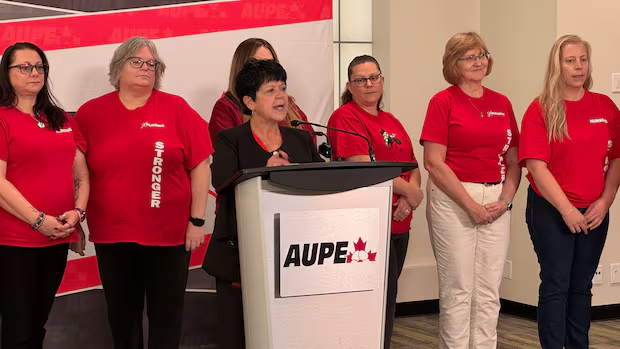98% of AUPE nursing care staff vote in favour of strike

Nursing care staff represented by the Alberta Union of Provincial Employees have voted 98 per cent in favour of strike action.
The vote took place between Oct. 30 and Nov. 3. The union says 11,031 members cast a ballot.
“They voted overwhelmingly in favour of strike action because they are fed up with stagnant wages and unsafe working conditions that hurt workers, patients, and Alberta’s public health care system,” AUPE president Sandra Azocar said at a news conference in Edmonton Wednesday.
AUPE says talks with its employer, Alberta Health Services and the four organizations that replaced the former provincial health authority, broke down in April. Bargaining between the sides are set to resume Thursday for mediation.
The 16,000 members, who are mostly licensed practical nurses and health care aides, could serve strike notice as early as Nov. 17.
“Our members would rather do their jobs, but they are prepared to stand up for what they deserve and to take job action if necessary,” Azocar said.
Potential job action by AUPE nursing care staff comes after teachers represented by the Alberta Teachers’ Association walked off the job for three weeks before they were ordered back to work by provincial legislation that included the notwithstanding clause to shield it from court challenges.
WATCH | AUPE nursing care staff vote in favour of striking:
Alberta nursing care staff vote to strike
AUPE says members including licensed practical nurses and health-care aides voted 98 per cent in favour of going on strike if the union and province can’t reach an agreement. The strike could happen as early as Nov. 20.
Nate Horner, Alberta finance minister and president of the treasury board, said in a news release that he was disappointed by the result of the strike vote.
He said the government is offering a 12 per cent wage increase over four years.
“This is a fair, competitive deal, in line with more than 87 other negotiated settlements across the public sector,” Horner said.
LPN pay
Horner said AUPE wants LPNs paid the almost the same as registered nurses, with salary increases ranging from 40 to 55 per cent. Horner said union negotiators also want lower annual hours of work. He said the overall proposal would cost more than $2 billion.
“While LPNs play a critical role, a key consideration that must be considered is the fact that they do not have the same education or extensive scope of practice as RNs,” Horner said.
Kate Robinson, the lead negotiator for the AUPE team, said LPNs scope of practice is 84 per cent of the duties performed by registered nurses but they are paid about 67 per cent of what RNs earn. In comparison, Manitoba pays its LPNs 81 per cent of what an RN earns.
Robinson said Alberta RNs are now the highest paid in Canada but LPN wages put them in seventh place.
“There’s a long ways to go in terms of not only catching up with the rest of Canada, but also keeping pace with the registered nurse wage.
“And the 12 per cent over four years just drives that gap even further apart than what it is now.”
Health care aides will become a regulated profession in February, which is also a factor in negotiations.
The union has an essential services agreement in the event of a strike. With a vacancy rate of 10 to 12 per cent, Robinson said some areas already have staffing levels lower than what the agreement prescribes during a strike.
Alberta NDP Leader Naheed Nenshi accused the UCP government of ignoring the workplace safety concerns raised by the union so it could use the notwithstanding clause to end the strike.
“Now that they’ve gotten the taste of this power, I think they’re trying to think of it as an all-purpose escape clause to keep from having to negotiate good deals.”
But Horner told reporters at the legislature that it was “highly unlikely” the notwithstanding clause would be used in this instance. Unlike the teachers, the government is dealing with a single bargaining unit, and the union has an essential services agreement in place, he said.
Still Horner wouldn’t completely rule it out.
“I’m hesitant to ever take anything totally off the table,” he said. “It’s a tool that the government has, but it’s certainly not something that we’re focused on. “
Jason Foster, professor of human resources and labour relations at Athabasca University, said he wouldn’t be surprised if the government tries using the notwithstanding clause again.
“Governments start to get addicted to this kind of interference,” Foster said. “The UCP has used the notwithstanding clause once to solve a dispute, I think it makes them more likely to use that tool again if they feel the need.”
Foster said labour unrest is happening across the country right now. He said workers feel like they’ve been suffering economically after going through the COVID-19 pandemic and a couple of years of high inflation.
He said Alberta public sector workers may also be angry at the government’s use of the notwithstanding clause against the teachers.





